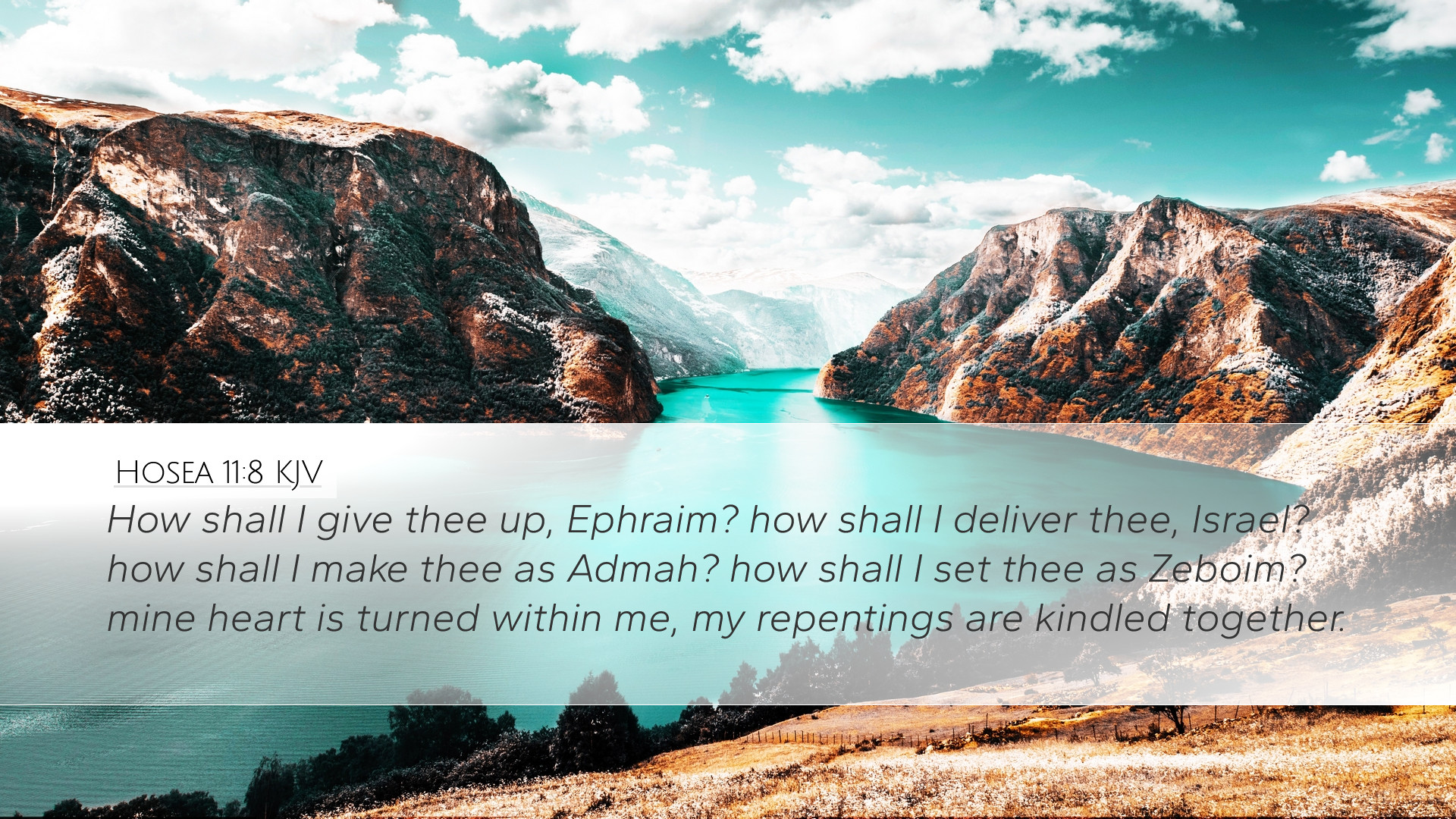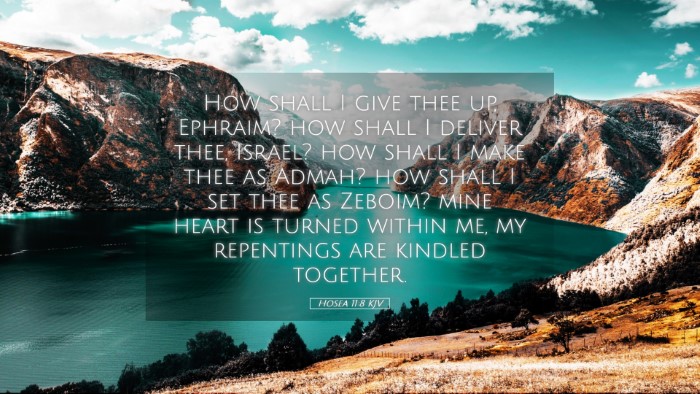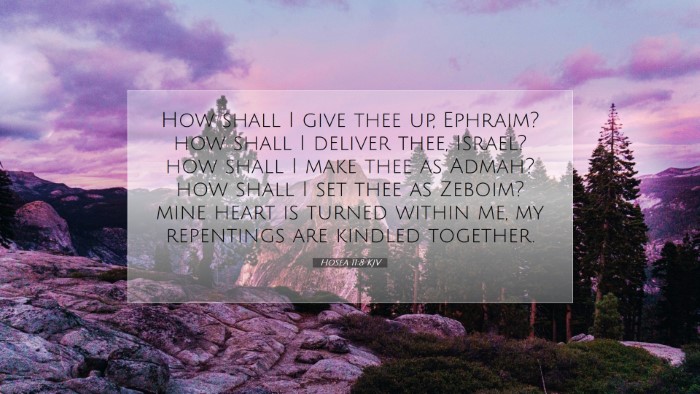Old Testament
Genesis Exodus Leviticus Numbers Deuteronomy Joshua Judges Ruth 1 Samuel 2 Samuel 1 Kings 2 Kings 1 Chronicles 2 Chronicles Ezra Nehemiah Esther Job Psalms Proverbs Ecclesiastes Song of Solomon Isaiah Jeremiah Lamentations Ezekiel Daniel Hosea Joel Amos Obadiah Jonah Micah Nahum Habakkuk Zephaniah Haggai Zechariah MalachiHosea 11:8
Hosea 11:8 KJV
How shall I give thee up, Ephraim? how shall I deliver thee, Israel? how shall I make thee as Admah? how shall I set thee as Zeboim? mine heart is turned within me, my repentings are kindled together.
Hosea 11:8 Bible Commentary
Commentary on Hosea 11:8
Bible Verse: Hosea 11:8 (KJV) - "How shall I give thee up, Ephraim? how shall I deliver thee, Israel? how shall I make thee as Admah? how shall I set thee as Zeboim? mine heart is turned within me, my repentings are kindled together."
Introduction
This verse from the book of Hosea captures the profound emotions of God as He contemplates the impending judgment upon Israel. The language used here is rich with personal anguish and divine love, presenting a tension that is deeply theological and spiritually revealing. In this commentary, we will draw insights from notable public domain commentaries by Matthew Henry, Albert Barnes, and Adam Clarke to understand the multiple layers of meaning embedded in this scripture.
The Emotional Turmoil of God
Hosea 11:8 portrays God in a posture of deep emotional struggle over the fate of His people, Ephraim and Israel. The repetitious questioning—"how shall I give thee up?"—highlights the extraordinary conflict within God between justice and mercy.
Matthew Henry's Insights
Matthew Henry emphasizes the compassionate nature of God, noting how these rhetorical questions underscore His reluctance to bring judgment upon His people. He writes, “This expresses both the love of God to them, and the anguish of his soul at the thoughts of their destruction.” Henry argues that God’s love is so profound that it makes Him hesitate to act in punitive judgment. This presents a God who is not stoic but deeply involved and emotionally invested in the lives of His people.
Albert Barnes' Perspective
Albert Barnes provides a commentary focusing on the historical context of Israel, linking their impending downfall with the cities of Admah and Zeboim, which were destroyed alongside Sodom and Gomorrah. He explains that God’s concern suggests that He does not take pleasure in destruction, as He questions how He could possibly treat His beloved people like those wicked cities. Barnes states, “The purpose of God is expressed in such a way as to show that it is with reluctance He consents to it.” This reinforces the idea of God's deep yearning for repentance and restoration over punishment.
Adam Clarke's Commentary
Adam Clarke elucidates the love of God by analyzing the specific cities mentioned. He notes that Admah and Zeboim represent the ultimate destruction due to disobedience and immorality. Clarke highlights how the reference to these cities serves as a reminder of the consequences of sin. He states, “God is not unmindful of his covenant, or indifferent to his promises.” This bending of God’s heart reveals the tension between His holiness and His desire for reconciliation with His people, portraying Him as a loving Father unwilling to forsake His children.
Theological Implications
The theological implications of Hosea 11:8 are vast and significant for both scholars and believers. It raises essential questions regarding God’s nature, particularly His justice versus His grace. The collective insights from the commentaries present a God who, while just, seeks relationship with His creation. His question, “How shall I give thee up?”, can be understood as an incredible expression of divine love that is willing to endure suffering rather than see His people lost.
The Nature of God's Love
This verse illustrates God's steadfast love even amidst grave disobedience. The duality of judgment and mercy is profound and speaks to the heart of the Gospel message. Pastoral reflections can emerge from this passage, emphasizing the importance of returning to God, recognizing His love, and the hope therein.
God's Desire for Repentance
The emotional language used here reveals that God desires His people to turn back to Him. The tone of lamentation indicates a longing for repentance rather than punishment. This presents a model for pastoral care in guiding congregations towards reconciliation with God.
Applications for Pastoral Ministry
For pastors, this passage serves as a foundation in preaching about God’s unyielding love and the necessity for repentance. It offers a powerful reminder when addressing churches that may feel the weight of sin, emphasizing that God's heart yearns for restoration.
Concluding Thoughts
Hosea 11:8 is a profound testament to the relational attributes of God, showcasing His deep emotional engagement with humanity. As we study this verse, let us reflect on the depths of God’s love and the call to repentance that resonates through His anguished questions. It is an invitation to every believer to recognize the seriousness of their walk with God and to embrace His loving reassurances that no matter how far we stray, His heart still seeks to draw us back to Himself.
May we be inspired by the truth contained in Hosea 11:8 that affirms God’s relentless pursuit of His people, teaching us to mirror that passion in our own lives and ministries.


